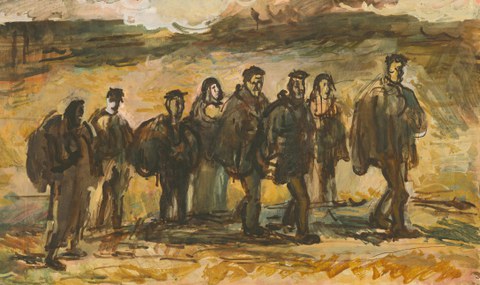Jul 29, 2025
Migration as a New "Method of Warfare": Legal Challenges for Individual Human Rights and the Demise of the Right to Asylum
Public Evening Event in Cooperation with Frauenkirche Dresden and as Part of the International Summer School on Human Rights in Theory and Practice: Navigating Chance - Contemporary Perspectives on Human Rights 2025 in Dresden
With the first codification of human rights after the Second World War, all people were guaranteed the right to seek protection from state arbitrariness and political persecution. In 1951, this right was enshrined in the Geneva Refugee Convention – a direct response to the mass displacements caused by the Holocaust and the persecution of dissenters. It is therefore especially concerning that this right to asylum is being deliberately undermined today. One example is the policy pursued by Belarusian President Lukashenko since 2020: by directing and forcing migration to Poland and Lithuania, Belarus seeks to overwhelm the European asylum system. This strategy is part of a hybrid warfare through which Belarus and Russia aim to destabilize the EU and deliberately attack its core values – freedom and human dignity.
The instrumentalization of migration is not a new phenomenon. As early as 1972, Uganda's dictator Idi Amin threatened the United Kingdom with mass emigration in order to force military assistance. Likewise, Erich Honecker deliberately attracted people from the Middle East with cheap flights and fast transit to West Berlin in order to exert pressure on West Germany. Today, however, such tactics have reached an entirely new dimension: they are part of large-scale destabilization campaigns that cast doubt on the guaranteed right to political asylum and make it difficult for all refugees – regardless of whether they are part of this political strategy or not – to find protection.
This evening event therefore sheds light on the legal and political challenges of this development. How should hybrid warfare involving migration flows be assessed under European and international law? How can policymakers respond, and what mechanisms might be conceivable? What status do refugees who are deliberately instrumentalized for politico-military purposes hold: do they remain people seeking protection in the legal and political sense, or do they even become a “weapon” that can be fought against?
Guests:
- Katja Meier, MdL
Member of the Landtag of Saxony and former Saxon State Minister of Justice and for Democracy, European Affairs and Equality - Katharina Thote
Representative of UNHCR in Germany - Dr. Anne Koch
Head of the Project "Strategic Refugee and Migration Policy", German Institute for International and Security Affairs (SWP) - Moderator: Prof. Dr. Dominik Steiger
Academic Director of the Center for International Studies, TU Dresden
Everyone interested is welcome to attend.
- The panel language is German, with simultaneous translation into English
- Time: 7:30 PM - 9:00 PM (Tuesday, August 26, 2025)
- Venue: Frauenkirche Dresden, Main Hall, Entrance D
Neumarkt, 01067 Dresden
Organizing Team
The public evening event at the Frauenkirche Dresden is organized by the Center for International Studies (ZIS) in cooperation with the Stiftung Frieden of the Frauenkirche Dresden, the Refugee Law Clinic at TU Dresden, Leipzig University, and the Technische Universität Dresden.
Sponsored by:
The Summer School 2025 is sponsored by the Funding Program Internationalization of TU Dresden, the Friends and Sponsors – Commitment to TU Dresden and Internationale Beziehungen Dresden e.V..
This project is funded by the Federal Ministry of Education and Research (BMBF) and the Free State of Saxony within the framework of the Excellence Strategy of the Federal and State Governments.
For any further questions or inquiry please contact us via our official Summer School email adress:



